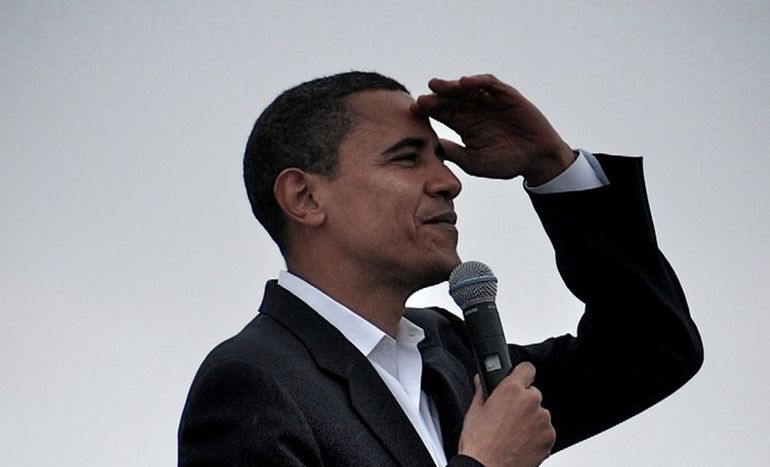
Europe vs the US: seven reflections
Published on
It’s been a year since Barack Obama was inaugurated president of the United States on 20 January. But despite his inspiring speeches, he is no Franklin Roosevelt, and even if he were, he needs 60 out of 100 votes in the US Senate to pass anything. Since the end of world war two, a power has emerged with the real potential to carry the world forward
When I first began travelling to Europe for research in the late nineties, I was trying to understand differences between the political systems and democratic institutions of the United States and Europe. I interviewed politicians, leaders, journalists, bureaucrats, political party leaders, union officials and business leaders. I had conversations with shop vendors, business owners, CEOs, taxi drivers, young people, people on buses, in elevators, restaurants, and cafés, in their homes and in the street, sometimes whether they wanted to talk or not. It was not only the political systems in Europe that were quite different. Europe’s institutions had been slowly taking shape during the cold war years. It was a fertile incubation period thanks to the Pax Americana which allowed each nation to take slow steps down its own development path. Europe’s brand of ‘social capitalism’ proposes a bold new path for human development, its leadership manifesting in the following ways:
Economic strength The EU, with its 27 member nations and a half billion people, has become the largest, wealthiest trading bloc in the world. It produces nearly a third of the world’s economy – nearly as large as the US and China combined. Europe has more Fortune 500 companies than either the US, China or Japan, and some of the most competitive national economies in the world, according to the world economic forum. Currently it even has a lower rate of unemployment than the US.
Economic democracy I began to hear about quintessentially European institutions and practices with funny-sounding names such as codetermination, works councils, supervisory boards, flexicurity, proportional representation, children's parliaments, universal voter registration, sickness insurance funds, green architecture, cogeneration, cap and trade, civic literacy and more. These practices, public-private partnerships and a vibrant small-business sector foster economic democracy. Americans can hardly imagine a world in which Wal-Mart’s board of directors has anywhere from a third to a half of its directors elected directly by its workers, yet most European nations employ some version of this as standard operating procedure.
Better healthcare European nations are rated by the world health organisation as having the best systems in the world. Yet they spend far less than the United States for universal coverage, even as US health care is ranked 37th - just ahead of Cuba and Slovenia. 47 million Americans, many of them children, don’t have any healthcare except a hospital emergency room, while in Europe even countries like Croatia, with far less wealth than America, provide healthcare to all.
Real family values Europe is better at supporting families and workers, providing quality healthcare, decent retirement, more vacation, paid parental and sick leave, free or nearly free university education, housing assistance and much more that the average American can only dream about. Hardly a ‘welfare state’, Europe's ‘social capitalism’ is an ingenious ‘workfare’ framework to help people stay healthy, productive and working during a time of rising inequality and economic crisis.
Readying for global warming Europe leads with widespread deployment of common sense conservation practices and ‘green design’, as well as renewable energy technologies like solar and wind power, more efficient mass transit and more. It's created hundreds of thousands of new jobs. Europe’s ecological ‘footprint’ (the amount of the earth’s capacity that a population consumes) is about half that of the US for the same standard of living.
Robust democracy After centuries of kings and dictators, Europe's political institutions and electoral methods have produced the most advanced representative democracies in the world, fostering inclusiveness, participation, consensus, multiparty representation and policy based on broad public support. Politics rule over economics, instead of the other way around.
Innovative foreign policy With America’s ‘hard power’ suffering setbacks, Europe’s ‘smart power’ - based on regional networks of nations and Europe’s own Marshall Plan for development - has produced a ‘Eurosphere’ with some 2 billion people - one third of the world - linked by trade, aid and investment to the EU.
So, if Europe isn’t the leader of the world now, who is? China? India? It will be decades - if ever - before these developing countries will achieve Europe or America’s prosperity level. In a make-or-break century beset by a worldwide economic crisis, global warming and geopolitical tensions, the European model has the potential to carry the world forward.
The author is a director at the New America Foundation in Washington DC, and author of the new book 'Europe's Promise: Why the European Way is the Best Hope in an Insecure Age'
*Forty conservative republican senators (that represent only a third of the nation) can block just about anything. America is suffering through the worst form of ‘minority rule’ because of a constitutional defect that elects two senators per state, regardless of population (California with 37 million people has two senators just like Dick Cheney’s Wyoming, with only a half a million people.) This gives the most conservative senators a veto over anything significant, including health care reform, policy to reduce carbon emissions and global warming, and more. Obama does not have a solution for this, and it will not change anytime soon due to the difficulties of amending the US constitution.
Image ©speedye/ Flickr



